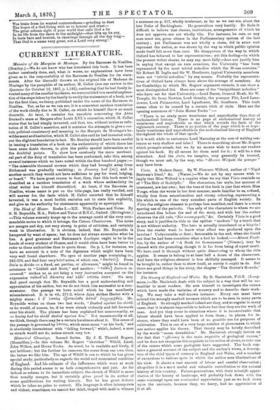The Iliad of Homer. Books With Preface and Notes. By
S. H. Reynolds, M.A., Fellow and Tutor of B.N.C., Oxford. (Rivingtons.) —This volume scarcely keeps up to the average merit of the very com- mendable series to which it belongs, the Catena Classicorum. The notes are meagre and dry, not very strong in point of criticism, and certainly weak in illustration. It is obvious, indeed, that Mr. Reynolds is hampered by want of space ; but he does not always economize what he has. A good grammar and Buttmann's Lexilogus ought to be in the hands of every student of Homer, and it would often have been better to refer to these authorities than to quota them. On p. 1, for instance, we have an account in a note of the digamma which might have been very well found elsewhere. We open at another page containing iv., 245-276, and find four very brief notes, of which one, " accirp6P1 From &ice to divide = a fixed, set portion, or allowance," might be found in substance in "Liddell and Scott," and another: rem] Daturis in- commodi" strikes us as not being a very instructive comment on the expression ro7oa cs; Ocisaro; zal xi& 07166W lacer.' We may find proof enough that Mr. Reynolds has a good understanding and appreciation of his author, but we do not think him successful as a com- mentator. One passage we have noted which he has manifestly misunderstood. It is in vii., 271-2, where Ajax strikes Hector with a mighty stone : 6 6' ioorrig 4ss-astocr9ri eteraV ivrxprik014. Mr. Reynolds writes on these two last words, "Dashed against his shield, as he would, of course, be, if he were struck violently and fell forwards over his shield. The phrase has been explained but unnecessarily, as having had his shield dashed against him." Not unnecessarily at all, we think, though there may be a certain harshness about it. The sense of the passage is governed by F)vrios, which must mean on his back," and is absolutely inconsistent with "falling forward," which, indeed, a man so struck would not do, unless struck very low.


































 Previous page
Previous page